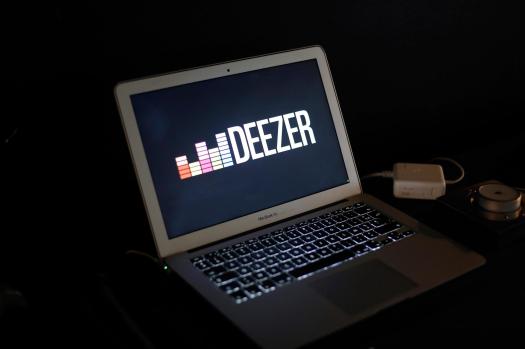By KELVIN CHAN
London (AP) In an effort to combat streaming scammers, music streaming service Deezer announced on Friday that it will begin to label albums that contain songs produced by artificial intelligence.
Related Articles
-
Pope Leo XIV flags AI impact on kids intellectual and spiritual development
-
New York Daily News and other outlets ask judge to reject OpenAI effort to keep deleting data
-
Amazon CEO Jassy says AI will reduce its corporate workforce in the next few years
-
Israel s spy agency used AI and smuggled-in drones to prepare attack on Iran
-
NAACP, environmental group notify Elon Musk s xAI company of intent to sue over facility pollution
Paris-based Deezer is struggling with an increase in music on its platform that was produced with artificial intelligence techniques, which it claims are being used to unlawfully collect royalties.
The app will alert users that certain tracks on an album were produced using song generators and show an on-screen label warning regarding AI-generated content.
Despite being a minor player in the music streaming market, which is dominated by Spotify, Amazon, and Apple, Deezer stated that AI-generated music is a problem that affects the entire business. According to a news statement from CEO Alexis Lanternier, the company is dedicated to protecting the rights of songwriters and artists at a time when copyright laws are being questioned in favor of training AI models.
The disruption brought about by generative AI systems—which are educated by online text, images, and audio—is highlighted by Deezer’s action. Numerous lawsuits are contesting AI businesses’ practice of gathering training data from the internet without paying for it.
About 20,000 tracks, or 18% of the songs submitted to Deezer’s platform daily, are now entirely artificial intelligence (AI) generated, according to an AI song recognition tool the company launched this year. In a recent interview, Lanternier stated that the percentage was 10% just three months prior.
Lanternier told The Associated Press that while AI offers many advantages, it also raises numerous concerns for the music industry. He stated that while using AI to create music is acceptable as long as an artist is involved, it becomes problematic when anyone—or even a bot—can do so.
Numerous songs are produced by music fraudsters. According to him, they post and attempt to be featured on playlists or suggestions in order to earn royalties.
Neither Deezer nor competing services like Spotify or Apple Music allow musicians to upload music directly. For artists with contracts, music labels or digital distribution platforms can handle it; for everyone else, a self-service distribution company can be used.
On Deezer, fully AI-generated music still only makes up around 0.5% of all streams. However, the business stated that it is clear that fraud is the main reason for these songs because it believes that up to 70% of AI song listens are performed by bots or streaming farms rather than real people.
According to Deezer, royalties will no longer be paid for AI tracks that are used to manipulate streams.
In the music industry, artificial intelligence (AI) has been a hot topic, with discussions centered on both its creative potential and its legality.
Record labels are suing Suno and Udio, two of the most well-known AI song generators, for copyright infringement, claiming they stole songs by artists ranging from Mariah Carey to Chuck Berry.
In a related case filed in Munich, Gema, a German royalty-collection group, is suing Suno, alleging that the service creates songs that are confusingly similar to the original versions by the artists it represents, such as Lou Bega’s Mambo No. 5, Boney M’s Daddy Cool, and Alphaville’s Forever Young.
News sources earlier this month said that major record labels were negotiating compensation with Suno and Udio.
According to Lanternier, Deezer analyzes the output of the same generators that are used to produce songs in order to identify tracks for tagging.
Because the song generates such a complex signal, we are able to recognize patterns. According to Lanternier, the song contains a wealth of information.
It appears that the AI music generators are unable to create tunes without subtle yet identifiable patterns that are always changing.
According to Lanternier, you must update your tool daily. Thus, we continue to produce music in order to train our system. Thus, we are using AI to combat AI.
Fraudsters can use streaming to make a lot of money. Lanternier cited a criminal case that occurred in the United States last year, which officials claimed was the first instance of music streaming that was inflated. A guy was accused by prosecutors of committing wire fraud conspiracy after creating hundreds of thousands of AI songs and employing bots to stream them billions of times automatically, earning at least $10 million.











